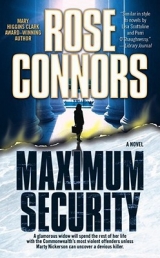
Текст книги "Maximum Security"
Автор книги: Rose Connors
Соавторы: Rose Connors
Жанры:
Криминальные детективы
,сообщить о нарушении
Текущая страница: 6 (всего у книги 14 страниц)
CHAPTER 13
Monday, October 16
Harry’s old Jeep sits alone in the office driveway when I arrive at eight o’clock. It looks worse than usual, as it often does on Mondays. Whenever he has a free Sunday, Harry four-wheels down Nauset Beach and stakes out a remote spot. He spends the day, the evening, and sometimes the wee hours of the next morning surf casting for stripers, blues, or whatever’s biting that week. He went yesterday. The Jeep’s mud flaps are sand-caked and the bottom half of its olive green chassis is white with the chalky residue of salt water.
The front office is empty. I leave my briefcase and jacket on one of the chairs and head for the kitchen in search of coffee. Harry’s office door is open and he’s laughing out loud on the telephone. Harry is one of the only people I know who’s immune to Monday-morning malaise. I wave to him as I pass, fill my mug from the pot he’s brewed, and return to lean in his doorway. He gestures for me to come in and sit.
That’s more easily suggested than done. The two chairs facing his desk are piled high with files, legal pads, and photocopied cases. One is topped off with a crumpled deli bag and an empty chocolate milk carton, litter from a prior day’s lunch. We all suffer from a chronic lack of administrative help in this office. Harry’s case is critical.
I lean against his wooden bookcase instead. He tells the person on the other end of the line to forget it, he’ll take his chances in court. He hangs up and laughs again. “She’s a piece of work,” he says.
Enough said. The person on the other end of the phone was Geraldine Schilling, Barnstable County’s District Attorney. She’s a piece of work by anybody’s standards; a pain in the ass by Harry’s. He must be feeling charitable this morning.
“She wants Rinky to do time,” he reports. “Sixty days.” He shakes his head at the telephone.
Rinky is Chatham’s only homeless person and he’s homeless by choice. He’s a tortured soul who prefers the streets and the woods to the shelter repeatedly offered by locals. He also prefers the voices in his head to anyone else’s conversation. Rinky rarely speaks to anybody the rest of us can see. Court documents dub him Rinky Snow, but no one seems to know where the surname came from. I secretly harbor the notion that it stems from the stuff he sleeps on half the year.
“He could do worse,” I tell Harry.
“Not in October, he couldn’t.”
Rinky has lived on Chatham’s streets since his return from the Vietnam War in the mid-sixties. It didn’t take long for the year-rounders to recognize his latent wounds. By unspoken agreement, we look the other way when Rinky spends the night in the woods on town-owned property, and when he drinks from a brown paper bag in public, and when he utters the occasional obscenity to an unsuspecting tourist.
Even the cops are in on the arrangement. They turn blind eyes to Rinky’s antics too—unless it’s winter. In winter they pick him up whenever they can, haul him in, and hold him as long as his transgression-of-the-moment allows. That way he won’t freeze to death during our frigid winter nights. Come spring’s thaw, they once again look the other way like the rest of us.
Harry’s been representing Rinky for decades. Rinky’s never done time as early as October, and Harry doesn’t intend to let him start now. Hell, sixty days starting now barely taps into the cold season.
But Rinky’s transgression-of-the-moment is more serious than usual. When two vacationing women approached him on Saturday night to ask for directions, he took a knife from under his coat and caressed its six-inch blade. As Harry sees it, Rinky didn’t actually threaten the visitors—he simply exercised poor judgment in sharing his prized possession with them. The two women don’t see it that way.
Of course, in Rinky Snow’s universe he could just as easily have been brandishing a bayonet—or a banana.
Rinky will be arraigned later today, but he’s not my concern at the moment. Harry will take good care of him, as usual. “Where the hell is the Kydd?” I ask.
Harry shrugs. “Haven’t seen him. I thought maybe you two went straight to the station.”
I shake my head. “We’re not going to the station. We’re meeting Walker here. At ten.” I lean forward and look out the window to see if the Kydd’s truck has pulled in yet. It hasn’t.
“Walker agreed?” Harry asks.
“Agreed to what?”
He smiles up at me. “Agreed to meet here?”
I’m distracted. Harry’s amused by that. So now I’m annoyed. “Of course he agreed. Why wouldn’t he?”
Harry’s smile broadens, but he says nothing. I know what he’s thinking. Mitch Walker agreed—at least in part—because he knows Louisa Rawlings is a force to be reckoned with. Walker has met her only once, but with Louisa, once is enough. Besides, he knows where she lives and that means he has a pretty good handle on her net worth. Money matters, especially at the earliest stages of a criminal investigation.
I decide to ignore Harry’s apparent amusement. I’ve no interest in discussing Louisa Rawlings’s many assets with him.
“The Kydd picked a hell of a day to sleep in,” I say as I head out of his office.
“Don’t worry,” he answers my back. “He’s done your warrant research.”
“How do you know that?” I turn and lean in the doorway again.
“He was here yesterday,” Harry says. “A man on a mission.”
“Yesterday? I thought you went fishing yesterday.”
“I did. But not until late afternoon. I stopped in here first for an hour or so to check messages and pick up a little.” He sweeps the room with one arm, as if he might have a shot at a job with Merry Maids.
I laugh out loud. I can’t help it. It’s scary to think this is the after-cleanup picture.
He frowns when I look back at him, apparently insulted. “Anyway,” he says, “the Kydd was already working when I got here and he was still hard at it when I left. He said he would be tied up last night. Wanted to get the job done by the end of the day.”
This information should make me feel better. But for some reason I can’t articulate, it doesn’t.
“And he looked like the future of civilization depended on the results of his research,” Harry continues. “So I think you can relax.”
I’m not relaxed. Harry’s news unsettles me. The Kydd made a point of telling me he had no plans. But so what? Plans develop sometimes. And why the hell should I care anyhow?
Harry rests his head against the back of his tall leather chair and looks up at the ceiling for a moment. “You know,” he says, pointing his pen at me, “I think maybe the Kydd has found himself a woman.”
“A what?”
“A woman,” he repeats, laughing. “You’ve heard of the species?”
I stand up straight in the doorway. As usual, my stomach races ahead of my brain.
“Think about it,” he continues, smiling and tapping the pen in his palm. “Big plans for last night. Working like hell so he could keep them. Later to the office than usual this morning. I smell a romance brewing.”
I’m speechless.
Harry winks at me.
I don’t wink back. The Kydd’s red pickup—parked in Louisa Rawlings’s driveway early yesterday—pops into my head. Morning dew undisturbed.
Harry chuckles. “Maybe my offer to hook him up with a good-looking inmate got to him, scared him into finding a sweetheart on his own.”
Now I see different scenes: the Kydd matter-of-factly negotiating the hardware on the double doors of Louisa’s veranda; his familiarity with the steam room switches in the Queen’s Spa.
I force myself to answer Harry. “Maybe you’re right,” I tell him. But I hope like hell he’s wrong. And it’s not because I begrudge the Kydd a love life.
I hurry back to the front office, grab my briefcase and jacket, and head out the door. Harry’s wrong, I tell myself. And so am I. It’s as simple as that. We’re just plain wrong.
The lean red fox in the road ahead hesitates when my Thunderbird speeds toward him and then he darts back into the bushes he came from. He’s staring after the car when I check the rearview mirror, his head and neck sticking tentatively into the road. He lifts his aristocratic snout in the air as he reemerges, apparently unhappy about riffraff in the neighborhood. Slow down, I tell myself. Even the wildlife deems this errand ridiculous.
And it is. The Kydd knows better than to get involved with a client. And what interest would Louisa Rawlings have in a boy little more than half her age? For God’s sake, she’s old enough to be his mother. Hell, she’s old enough to be his big brother’s mother too.
My head hurts.
But my stomach feels worse. It knots when I pull into the Rawlingses’ driveway. The Kydd’s red pickup is here, right where it was yesterday, roof and hood dew covered. Its windows are fogged, just as they were yesterday, and tiny dew-fed rivers once again trickle down the misty glass.
The front door of Louisa’s house is closed, but predictably unlocked, and I barge in as if I’m a one-woman SWAT team. From the foyer, I hear the steady pelting of water in the first-floor shower. I pause for just a second—haste is often an effective substitute for courage—and then crack open the door to the master suite.
Apparently Louisa got first dibs on the Queen’s Spa. The Kydd is ensconced in her king-size bed, leaning against a mountain of pillows, the lilac sheets pulled up to his stomach. He’s naked above the sheets, one arm draped over Pillow Mountain, his hand pressed against a bedpost, a lit cigarette dangling between his fingers. I didn’t know he smoked.
He jumps about a foot and a half when the door squeaks.
“Jesus Christ, Marty. What the hell are you doing here?” He bolts upright in the bed, yanks the sheets up to his chest, and damn near drops his cigarette underneath them in the process.
“What am I doing here?” I find it hard to believe we’re having this conversation. “What am I doing here? That’s not really the question, is it, Kydd?”
He says nothing for a moment, stares down at the sheets he’s clutching as if he’s never seen them before, and then returns his gaze to me. His expression suggests he’s genuinely surprised to realize he’s not wearing a suit. “Please,” he says finally, swallowing hard and pointing toward the bathroom door. “Give me a minute. I’ll meet you outside.”
“You’ll meet me inside,” I tell him. No need to invite the neighbors to this gathering. There aren’t any neighbors at the moment, of course. But still. “In the sunroom,” I add.
He nods like a bobble-head doll. He’d agree to meet me in Hades right now if it’d get me out of Louisa Rawlings’s boudoir. He throws his long legs over the side of the bed farthest from me, careful to keep the sheets pulled up above his hips.
“And Kydd.”
“What?” He twists back toward me, then jumps up and does a little dance behind the sheets. He really did drop his cigarette this time. “What?” he repeats.
“Don’t forget your goddamned pants.”
“Are you out of your mind, Kydd?” I slam the sunroom doors and don’t wait for an answer. It’s pretty clear that he is. “She’s a client, for Christ’s sake.”
“But she won’t be,” he says. “Not after today.”
“What in God’s name are you talking about? You’re not making any sense.” I don’t normally hiss, but it comes naturally at the moment.
The Kydd’s wearing faded blue jeans and a short-sleeved under-shirt. He’s barefoot and beltless. “Marty,” he says, his tone suggesting this is nothing more than a minor misunderstanding, “Louisa didn’t have anything to do with her husband’s death.”
“Oh, really?”
“Really.”
“This is your professional opinion?”
“It is,” he says, his grin not nearly sheepish enough.
I throw my hands in the air.
“Marty,” he tries again, “she didn’t. And it’s obvious she didn’t. Mitch Walker will see that as soon as he talks with her this morning. That will be the end of this whole damned thing. She won’t be a client anymore.”
The sunroom doors open. Enter Louisa, elegant as ever, even with wet hair. She’s in a pale blue dressing gown—satin. It hangs to her ankles, clings to each curve along the way. “Marty,” she says, sounding genuinely happy to see me. “Good morning.”
Good morning? Has the world gone tilt?
“Oh,” she says, looking from the unshaven, almost-dressed Kydd to me. She seems to recall—slowly—the connection between the two of us. “Oh, dear,” she adds after a pause. “This is awkward.”
“No,” I tell her. “We passed awkward a long time ago, Louisa.”
The doorbell. This is swell. With any luck it’s a delegation from the Board of Bar Overseers, preferably with a Cape Cod Times reporter in tow. A photographer would add a nice touch too. This is a Kodak moment if ever there was one.
Louisa turns to answer the bell, but she hesitates at the sunroom doors. “Perhaps you should wait here, Kevin,” she says to the Kydd.
He nods.
“Kevin?” I repeat, gaping at him.
“It is my name,” he says.
I leave him standing shoeless in the sunroom and follow Louisa’s blue satin sashay toward the persistent chimes of the doorbell. My stomach is already knotted, but the knots develop knots of their own when I see that she’s headed toward the kitchen door. It’s a Cape Codder who’s come to call, a local, and whoever it is has given up on the doorbell and has started knocking. Hard.
Louisa’s kitchen door has a dead bolt at eye level, but apparently it isn’t engaged. The persistent knocks of the visitor push the door partially open as we approach. Louisa gets to it ahead of me and pulls it open the rest of the way. Her polite smile suggests it’s Avon calling. “Can I help you?” she says.
“Mrs. Rawlings?”
I freeze. I know that voice. It’s Tommy Fitzpatrick, Chatham’s Chief of Police.
“Yes,” Louisa replies. “That’s me.”
“You’re under arrest,” he says, “for the murder of your husband, Herbert Andrew Rawlings.”
CHAPTER 14
Tommy Fitzpatrick looks only slightly surprised when I step into the doorway beside Louisa. He stands on the deck, warrant in hand, Detective Lieutenant Mitch Walker at his side. They’re the same height, and in the glare of the morning sunshine they look like uniformed negatives of each other: the Chief fair-skinned and strawberry blond; Mitch Walker swarthy and dark-haired. The Chief’s car sits in the driveway, engine running and lights swirling. Two cruisers idle behind it, a pair of troopers in each.
Mitch Walker recites Miranda warnings at Louisa and the Chief volunteers the warrant to me. I take it, though I know I needn’t bother. Tommy Fitzpatrick does it right—always. He wouldn’t have come here this morning unless one of his minions had jumped through all the proper procedural hoops beforehand. And my involvement in the case has nothing to do with it. Tommy would do it right even if the accused were pro se, representing herself.
Louisa’s smile has vanished. She turns away from Mitch Walker, ignores his monologue. Her dark, moist eyes dart from the Chief to me, panic beginning to set in. “There must be some misunderstanding,” she says, leaning into the doorknob with one hand, fingering her slender throat with the other. Her voice is raspy, barely more than a whisper.
No one answers. Instead, Tommy Fitzpatrick faces me. “Taylor Peterson hauled the body in at about four this morning,” he says, “with his first codfish catch of the day.”
Louisa gasps and I put my hands up, signaling her to be quiet. She covers her mouth with a fist.
“Peterson phoned the station,” the Chief continues. “We met him at the Fish Pier a few hours ago.”
I nod. Taylor Peterson is an old friend of mine. We went through grade school and high school together. He’s a fifth-generation Chathamite, a quiet man whose family has always made its living at sea. I wonder if any of his ancestors ever hauled in a comparable catch.
The Chief takes a deep breath. “We had plenty of company,” he says, “even at that hour. The Coast Guard boarded and a crew from the ME’s office was waiting; they did the post right away.”
My throat closes. A postmortem posthaste. Only the DA can make that happen. Geraldine Schilling must think she’s looking at a real one. And when Geraldine sees a real one, she sinks her teeth in like a pit bull. No doubt the ugly details are spelled out in the warrant I’m holding, but I don’t read it. Not yet.
The Chief still faces me, but he tilts his head toward Louisa. “I’m guessing your client would like to get dressed before we go.”
I nod again.
The Chief turns and signals to the first cruiser in the driveway and a petite female officer emerges from the passenger side. We stand mute until she joins us—even Mitch Walker has finally fallen silent—and then the Chief arches his pale eyebrows at me. He’s asking if I’d like to be the one to tell my client she’ll have company while she dresses. If not, he’ll do it for me.
“Louisa,” I tell her, “Officer…”
I know this cop’s name but it escapes me at the moment, so I check the narrow silver badge on the pocket of her long-sleeved navy blue shirt. Young. It’s hard to believe I forgot that one. She looks like she’s about twelve. “Officer Young will go with you and stay in the room while you change. It’s standard procedure.”
Louisa sizes up the freckle-faced policewoman and then turns her wide eyes back to me. Her expression says I must be joking. Little does she know. In the world of indignities that awaits her, this one is minuscule.
“Just do it,” I tell her. “Go get dressed. And keep your mouth shut.”
The Chief signals to the idling cruisers once more and, simultaneously, they cut their engines. Officer Young’s partner steps out from the driver’s side of the first car, two more male uniforms from the second. I check the last page of the warrant as they cross the deck and approach the kitchen door. I find what I knew I would find: they have judicial authority to search the premises.
I step back so they can enter. The Chief and Mitch Walker come inside first, the trio of uniforms in single file behind them. The last one in deposits an evidence crate just inside the door and each officer takes a pair of gloves, a fistful of bags, and a black marker from it. With a silent gesture, the Chief directs each of them to a different section of the house. I check their name tags to refresh my memory as they receive their assignments: Stahley to the second floor; Glover to the foyer and living room; Holt to the sunroom and kitchen.
The sunroom.
Officer Holt’s hand is on the doorknob before I can speak. Not that I have a damned thing worth saying anyhow. He opens the door, then stops cold. He sends a surprised glance over his shoulder to the Chief, the faintest hint of a smile coming to his lips, and then stares into the sunroom again.
“Working,” the Kydd mumbles from inside. “I’m, uh, working here.”
If the place weren’t crawling with cops, I’d strangle the Kydd now instead of later.
Tommy Fitzpatrick crosses the length of the kitchen and stands behind Officer Holt. Mitch Walker follows.
The Kydd clears his throat. “Gentlemen,” he says, as if he’d been expecting them.
All three of them nod at him. “Mr. Kydd,” they say, almost in unison.
The Kydd emerges from the sunroom, careful not to brush against Officer Holt as he slips past. “I was, uh, working in there,” he says again.
All three cops take him in from head to toe: his stubbled chin; his beltless pants; his bare feet.
Now it’s my turn to clear my throat. I tap the warrant I’m holding when the Kydd looks my way.
“Ah,” he says, as if the universe makes sense to him now. “I can, uh, finish up later.” He gestures toward the sunroom as if he’s trying to sell the place. “Please,” he says to Officer Holt, “go right ahead. I’ll just, um…”
He looks over at me and I glare back.
“I’ll just wait right here. That’s what I’ll do.”
That’s what he’ll do, all right. I head back toward the kitchen door and out to the deck, leaving the Kydd to deal with law enforcement on his own.
Tommy Fitzpatrick is right behind me. I figure since Officer Holt is searching the sunroom, Mitch Walker must be enjoying a little private time with the Kydd. Mitch probably hasn’t had this much fun in years. I remind myself again to strangle the Kydd as soon as time permits.
The Chief leans on the deck railing beside me, both of us looking out at the crashing waves. Winds are brisk today, seas rough. “Have you read it?” he asks.
He’s referring to the warrant.
“Not yet,” I tell him. “Want to give me a sneak preview?”
He leans down a little farther, clasps his hands together and rests on his forearms. “Your client’s story didn’t check out,” he says. “She lied to us about where she was last Sunday.”
I keep my eyes on the waves and wait.
“She did go to her club,” the Chief continues, “and she played nine holes, just as she said. But she didn’t eat. She never made it to the grill.”
I turn from the water and look at him.
“Seems she had something else to do,” he adds.
Tommy Fitzpatrick knows me well enough to know I won’t react. He looks out at the waves and apparently decides to move on. “Official cause of death is drowning,” he says to the pounding surf.
I nod, knowing there’s more.
“Secondary to head trauma,” he says.
I feel a tiny surge of hope. Head trauma isn’t inconsistent with a boating accident. It doesn’t necessarily rule out suicide either.
“The body was bound,” Tommy adds. “Wrists and ankles.”
I’m embarrassed more than anything else. Embarrassed by my millisecond of hope. I should know better by now.








